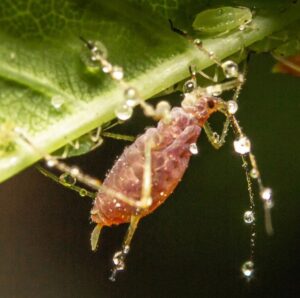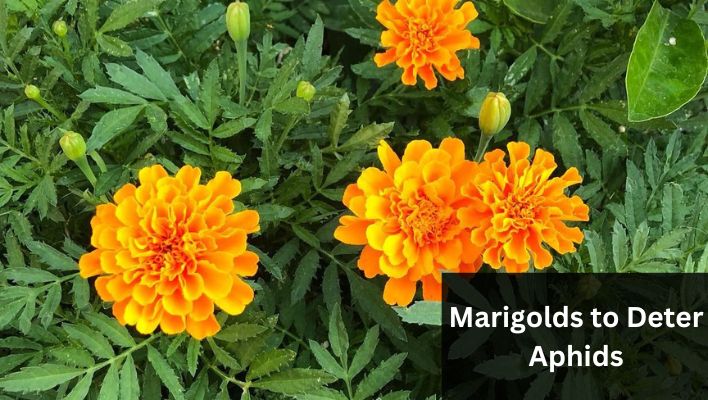Are you tired of battling aphids in your garden? Those tiny pests can wreak havoc on your plants, causing stunted growth and frustration for gardeners everywhere.
Below we highlight a natural and eco-friendly solution that not only keeps aphids at bay but also adds a burst of vibrant color to your garden. Say hello to marigolds, the unsung heroes of pest control!
Now that organic and environmentally friendly solutions are gaining popularity, it’s no wonder that marigolds have caught the attention of gardeners seeking a natural way to tackle aphid infestations.
These beautiful flowers not only possess a vibrant allure but also possess a hidden power: the ability to deter aphids with their unique properties.
Imagine a garden filled with marigolds, their cheerful blossoms swaying in the breeze, all while providing a defense system against aphids. It’s a win-win situation!
Below, we’ll explore the potential of marigolds as a natural pest control method and delve into the benefits of using organic and environmentally friendly solutions.
Understanding Aphids
Aphids are small, soft-bodied insects that are a common and persistent garden pest. They belong to the order Hemiptera and are characterized by their piercing-sucking mouthparts, which they use to extract sap from plants.
These tiny pests come in a variety of colors, including green, brown, black, or even translucent, and can be found on the stems, leaves, and flowers of many plants.
Aphids are particularly troublesome because of their rapid reproductive cycle. They reproduce asexually, meaning that females can give birth to live nymphs without the need for mating.

This allows aphid populations to explode within a short period. In favorable conditions, aphids can mature from nymphs to reproductive adults in as little as one week, resulting in exponential growth of their numbers.
The damage caused by aphids can be significant and detrimental to garden plants. As they feed on plant sap, aphids weaken the plants and extract essential nutrients.
This can lead to stunted growth, yellowing or curling leaves, distorted or deformed shoots, and reduced overall plant vigor.
Additionally, aphids excrete a sticky substance called honeydew, which attracts ants and can promote the growth of sooty mold, further compromising the plant’s health.
Controlling aphid populations is crucial for maintaining the health and vitality of garden plants. However, it’s essential to find effective and sustainable methods to manage aphids without relying on harmful chemical pesticides.
This is where the importance of exploring natural pest control options, such as using marigolds, comes into play.
By understanding aphids’ biology and behavior, as well as their potential for rapid infestation, we can seek environmentally friendly approaches to keep their populations in check and preserve the balance in our gardens.
The Natural Power of Marigolds
When it comes to deterring aphids, marigolds have emerged as a potential solution that has been utilized for centuries.
These vibrant flowers have earned a well-deserved reputation as natural repellents, making them a favorite among gardeners seeking a chemical-free approach to pest control.
Historically, marigolds have been employed in pest control due to their strong scent and unique properties. Their pungent aroma is known to repel not only aphids but also other common garden pests.
It’s as if marigolds have a built-in defense mechanism, warning insects to keep their distance.
One of the fascinating aspects of marigolds is the diverse range of species available. From the popular French marigolds (Tagetes patula) to the elegant African marigolds (Tagetes erecta), each variety boasts its characteristics and appeal.

Some marigolds feature vibrant orange and yellow petals, while others showcase delicate blooms in shades of red and gold. With so many options, you can select marigolds that not only repel aphids but also enhance the visual aesthetics of your garden.
Marigolds also fit perfectly into the concept of companion planting. This strategy involves strategically placing plants together to maximize their benefits. When it comes to aphid control, marigolds serve as excellent companions for a wide range of vegetables and herbs.
Their strong scent acts as a natural barrier, shielding neighboring plants from aphid infestations. By incorporating marigolds into your garden, you not only deter aphids but also create a harmonious environment where plants work together to thrive.
So, whether you choose the sunny French marigolds, the bold African marigolds, or any other variety, you can rest assured that these remarkable flowers possess the natural power to deter aphids and play an essential role in the concept of companion planting.
The Science Behind Marigolds and Aphids:
It’s one thing to hear anecdotes about marigolds deterring aphids, but what does science have to say about it? Several scientific studies have been conducted to evaluate the effectiveness of marigolds as a natural deterrent for these pesky pests. The results are quite intriguing.
One of the key compounds found in marigolds that may repel aphids is pyrethrum. Pyrethrum is a natural insecticide derived from the flowers of certain chrysanthemum species, including some varieties of marigolds.
It acts as a neurotoxin, disrupting the nervous system of aphids and making them less likely to settle on plants. The presence of pyrethrum in marigolds provides an additional layer of defense against aphid infestations.
Another compound found in marigolds that have been linked to aphid deterrence is limonene. Limonene is a citrus-scented chemical that acts as a natural insect repellent.
It is known to interfere with the aphids’ ability to detect their host plants and may also repel them due to their strong scent. The combination of pyrethrum and limonene in marigolds makes them an effective natural deterrent against aphids.
In these scientific studies, researchers have conducted controlled experiments to evaluate the impact of marigolds on aphid populations. The findings consistently point towards marigolds as a valuable tool in aphid control.
It has been observed that the presence of marigolds in gardens significantly reduces aphid infestations compared to gardens without marigolds.
The significance of these studies cannot be overstated. They provide scientific evidence to support the long-standing belief in marigolds’ aphid-repellent properties.
The compounds found in marigolds, such as pyrethrum and limonene, play a crucial role in repelling aphids and protecting plants from their destructive feeding habits.
So, the next time you spot a marigold in bloom, appreciate not only its beauty but also its scientific prowess in deterring aphids, and other pests. The power of marigolds to naturally combat these pests is not just a myth but a proven fact backed by scientific research.
How Marigolds Deter Aphids
Marigolds possess fascinating mechanisms that contribute to their ability to repel aphids. One of the primary ways marigolds deter these tiny pests is through their strong scent. The distinct aroma emitted by marigold flowers acts as a natural deterrent for aphids.
Aphids rely heavily on their sense of smell to locate suitable host plants. When they encounter the strong scent of marigolds, it disrupts their sensory perception and discourages them from settling on nearby plants.
Essentially, the fragrance of marigolds creates a “keep out” sign for aphids, deterring them from causing damage. Additionally, visual cues may also play a role in aphid deterrence. Marigolds feature vibrant and contrasting colors, such as vibrant oranges, yellows, and reds.
These visually striking flowers may confuse and discourage aphids from approaching. The combination of strong scents and eye-catching colors creates an unappealing environment for aphids, prompting them to seek alternative hosts.
Chemical interactions between marigolds and aphids may also contribute to their deterrence. While marigolds emit a strong scent, they may also release certain chemical compounds through their roots, known as root exudates.
These compounds can influence the soil environment and potentially deter aphids from colonizing nearby plants. The exact mechanisms of these chemical interactions are still being studied, but they provide intriguing possibilities for further exploration.
It’s important to note that marigolds alone may not eliminate aphids from your garden. However, by incorporating marigolds strategically and combining their use with other organic pest control methods, you can significantly reduce aphid populations and protect your plants.
Best Practices for Using Marigolds in Pest Control:
Incorporating marigolds into your garden or landscape can be a powerful tool in organic pest control. Here are some practical tips to make the most of marigolds and maximize their effectiveness:
- Companion Planting: One of the most effective ways to utilize marigolds is through companion planting. Interplant marigolds with susceptible plants that are prone to aphid infestations. The strong scent and visual cues of marigolds will create a protective barrier for your vulnerable plants. Consider planting marigolds alongside vegetables like tomatoes, peppers, and broccoli, or herbs like basil and parsley.
- Varied Marigold Species: Experiment with different Marigold species to benefit from their unique characteristics. French marigolds (Tagetes patula) are known for their compact size and are great for edging beds or planting in containers. African marigolds (Tagetes erecta) are taller and can provide a bold burst of color in the garden. Mixing different marigold varieties adds visual interest while increasing the overall effectiveness against aphids.
- Plant Placement: Optimal placement of marigolds is essential to maximize their effectiveness. Plant them close to vulnerable plants, ensuring that aphids encounter the strong scent early on. For example, bordering a row of vegetables with marigolds or interspersing them throughout a flower bed can create a strong protective zone.
- Regular Maintenance: Like any plant, marigolds require regular maintenance to thrive. Keep them well-watered and fertilized, following the specific requirements of the marigold species you choose. Remove spent blooms to encourage continuous flower production. Healthy and vigorous marigolds will provide better protection against aphids.
- Supplemental Pest Control: While marigolds are effective in deterring aphids, they may not eliminate aphid populations. To enhance their pest control abilities, combine marigolds with other organic pest control methods. These may include introducing beneficial insects like ladybugs or lacewings, using insecticidal soaps or oils, or employing physical barriers such as row covers.
It’s important to note that marigolds should not be solely relied upon as a standalone solution for pest control.
They work best when incorporated into an integrated pest management approach, combining various techniques for optimal results.
By following these best practices, you can harness the power of marigolds to create a more pest-resistant garden or landscape.
The combination of companion planting, varied species, strategic placement, regular maintenance, and supplementary pest control measures will help you achieve a healthier and more vibrant garden while naturally deterring aphids and other pests.

Are marigolds effective against other garden pests?
Yes, marigolds are known to be effective against a range of garden pests, not just aphids. While they are particularly renowned for repelling aphids, their pest-deterrent properties extend to other common garden pests as well. Here are a few pests that marigolds can help control:
- Whiteflies: These small, sap-sucking insects can be a nuisance in the garden. Marigolds emit a strong scent that repels whiteflies, making them less likely to infest nearby plants.
- Nematodes: Nematodes are microscopic worms that can cause damage to plant roots. Certain marigold varieties, like Tagetes erecta, release chemical compounds into the soil that help suppress nematode populations.
- Mexican bean beetles: These beetles feed on the leaves of bean plants, causing significant damage. Planting marigolds near your bean plants can deter Mexican bean beetles from settling and feeding on your precious crop.
- Tomato hornworms: Tomato hornworms can quickly defoliate tomato plants. By interplanting marigolds with your tomato plants, you can help deter these voracious caterpillars.
- Cabbage worms: Marigolds can repel cabbage worms, which are common pests of cabbage, broccoli, and other brassica plants.
- Squash bugs: Planting marigolds near squash plants can help deter squash bugs, which can damage the leaves and fruits of squash and pumpkin plants.
- Flea beetles: Marigolds may also repel flea beetles, which can feed on the leaves of various garden plants, including tomatoes and eggplants.
Other pests include Thrip, Leafhoppers, Spider mites, Mealybugs, Squash vine borers, Colorado potato beetles, Carrot flies, Cucumber beetles, Scale insects, and Japanese beetles.
While marigolds may not eliminate these pests, they can significantly reduce their populations and minimize the damage they cause.
The strong scent and potentially allelopathic compounds produced by marigolds play a role in deterring a variety of garden pests, making them a valuable addition to your pest control arsenal.
Remember to strategically place marigolds throughout your garden or interplant them with susceptible plants for the best results.
Combining marigolds with other organic pest control methods and practicing good gardening practices, such as regular monitoring and proper plant care, will help create a healthier and more pest-resistant garden overall.
How long do marigolds take to repel aphids?
Marigolds have varying timelines when it comes to repelling aphids. While some gardeners may notice a reduction in aphid activity shortly after planting marigolds, others may take a bit longer to see the desired results.
It typically depends on factors such as the size of the marigold plants, the number of marigolds planted, and the severity of the aphid infestation.
In general, marigolds start emitting their strong scent as soon as the flowers begin to bloom. This scent acts as a deterrent for aphids, making them less likely to settle on nearby plants.
However, it may take some time for the scent to permeate the surrounding area and effectively repel aphids.
For smaller marigold plants, it may take a few weeks for the fragrance to become potent enough to deter aphids effectively.
On the other hand, more mature and established marigold plants can emit a stronger scent from the start, potentially repelling aphids sooner.
It’s important to note that marigolds work best when used as part of a comprehensive pest management approach.
While they can help deter aphids, it’s advisable to monitor your plants regularly and take additional measures if aphid populations persist.
This may include employing physical removal methods, introducing beneficial insects, or using organic insecticidal soaps or oils as necessary.
By combining marigolds with other pest control techniques and maintaining a proactive approach, you can create an environment that is less hospitable to aphids and promotes the overall health of your garden.


FAQs
Are marigolds effective against all types of aphids?
Marigolds are generally effective in deterring many types of aphids. While they may not repel every single species of aphid, they are known to have a broad-spectrum repellent effect.
The strong scent emitted by marigolds and the potential chemical compounds they release act as a deterrent for various aphid species.
However, it’s worth noting that the effects may vary depending on the specific aphid species and the severity of the infestation. In some cases, additional pest control measures may be necessary to complement the use of marigolds.
How many marigold plants do I need to deter aphids?
The number of marigold plants needed to deter aphids can vary depending on factors such as the size of your garden, the proximity of vulnerable plants, and the severity of the aphid infestation.
As a general guideline, it is recommended to plant marigolds every 1-2 feet (30-60 cm) throughout the affected area.
This spacing helps ensure that the strong scent of marigolds permeates the vicinity, creating an effective barrier against aphids.
However, for smaller gardens or containers, even a few strategically placed marigold plants can contribute to aphid deterrence.
Can marigolds attract other pests or insects?
While marigolds are primarily known for repelling pests, they can occasionally attract certain insects. For instance, some species of beetles, like soldier beetles and ladybugs, are attracted to marigolds for shelter or as a food source.
However, these insects are generally beneficial to the garden as they feed on other pests, including aphids.
The overall positive impact of marigolds in deterring aphids and attracting beneficial insects outweighs any potential minor attraction to certain insects.
Do marigolds have any additional benefits for the garden?
Yes, marigolds offer several additional benefits for the garden beyond their pest-deterrent properties. They are known to attract pollinators such as bees and butterflies, contributing to the overall health and productivity of your garden.
Marigolds also have allelopathic properties, meaning they release certain chemical compounds that inhibit the growth of nearby weeds, reducing competition for resources.
Additionally, marigolds are generally low-maintenance plants, easy to grow from seeds, and provide vibrant blooms that add aesthetic appeal to your garden.
Are there any specific marigold varieties that work better against aphids?
While various marigold varieties can help deter aphids, some gardeners find that certain types exhibit stronger repellent properties. French marigolds (Tagetes patula) and African marigolds (Tagetes erecta) are two commonly recommended varieties for aphid control.
French marigolds are known for their compact size and strong scent, making them ideal for bordering garden beds or planting in containers. African marigolds are taller with larger flowers, providing a visually striking barrier against aphids.
However, it’s important to remember that the effectiveness of marigolds against aphids is a combination of their scent, visual cues, and potential chemical interactions, rather than solely relying on specific varieties.
Conclusion
Marigolds have long been recognized as a natural and effective deterrent for aphids and other garden pests. Throughout this article, we have explored the various aspects of using marigolds as a pest control method.
We discovered that marigolds possess unique characteristics, including their strong scent, visual cues, and potential chemical interactions, which contribute to their ability to repel aphids.
Scientific studies have confirmed the effectiveness of marigolds in deterring aphids, and their reputation as a natural repellent is well-founded.
Marigolds emit a distinct fragrance that disrupts aphids’ sensory perception, making them less likely to settle on nearby plants. Their vibrant colors and potential chemical compounds further discourage aphids from causing damage.
We discussed best practices for using marigolds in pest control, such as companion planting, varied marigold species, strategic placement, regular maintenance, and supplementing with other organic pest control methods. By following these guidelines, gardeners can make the most of marigolds’ pest-repellent properties.
Marigolds are not only effective against aphids but can also help deter other common garden pests like whiteflies, nematodes, Mexican bean beetles, and tomato hornworms.
However, it’s important to remember that marigolds should be used as part of an integrated pest management approach, combining different techniques to achieve the best results.
